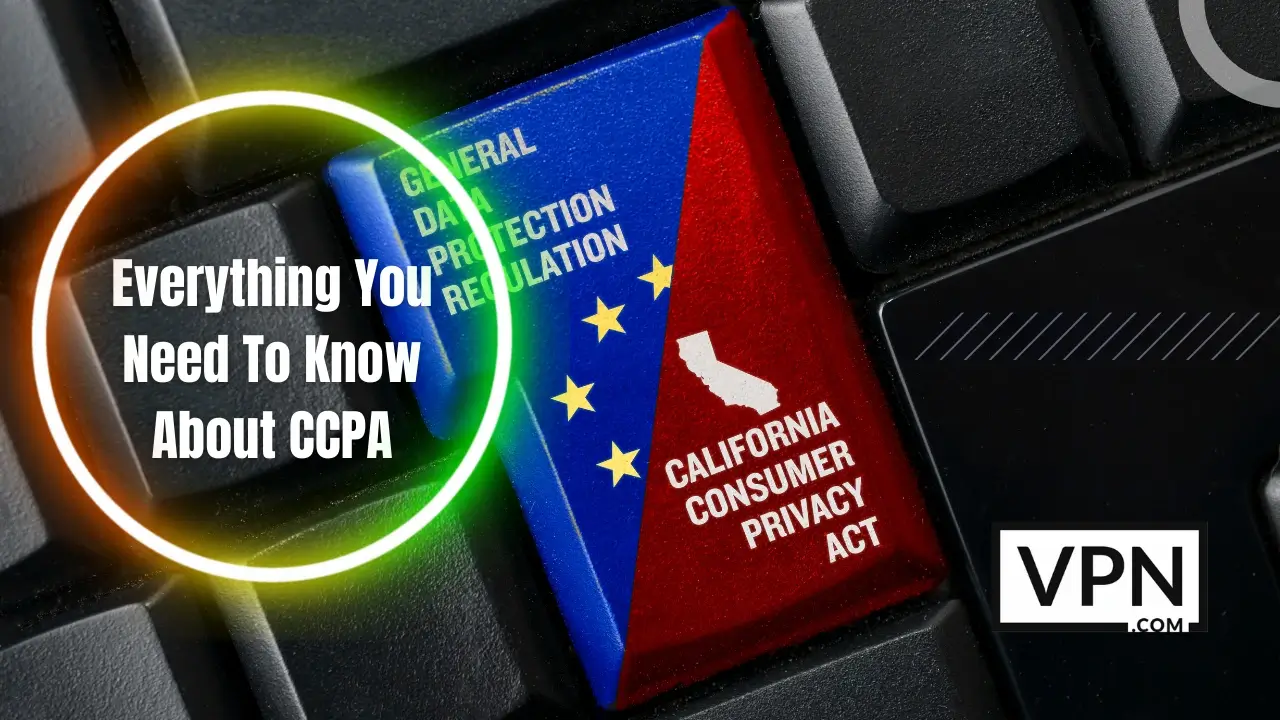Everything You Need To Know About CCPA

A ground-breaking piece of legislation, the California Consumer Privacy Act (CCPA), attempts to safeguard Californians’ right to privacy. Its purpose revolves around enhancing transparency, control, and accountability in the vast landscape of personal data collected by businesses.
Essentially, it empowers Californians by providing them with critical tools to safeguard their sensitive information online. CCPA rights outline a comprehensive set of requirements for organizations, which entails offering consumers the right to know what personal data is being collected, the purpose of its collection, and with whom it is shared, or sold.
Additionally, it gives people the option to refuse the sale of their sensitive information and request the erasure of their personal data. By adhering to these mandates, companies operating within California’s jurisdiction demonstrate their commitment to prioritizing consumer privacy in an increasingly digitized world.
California Consumer Privacy Act

A data breach is a specific type of security event affecting sensitive information, such as customer accounts and financial records. The California Consumer Privacy Act (CCPA), which emphasizes the value of preserving consumers’ personal information, requires data breaches to be disclosed in California.
Breaches can happen in several ways, such as when data is stolen via hacking activities or unintentionally revealed by employees. It’s critical that companies take the necessary steps to ensure their systems are secure to protect their customers’ data and prevent any further risks associated with breaches.
Even if there is no malicious intent involved in a breach, it can often leave customers deeply unsettled as unfortunately, all forms of data breaches open an array of chances for misuse and exploitation of confidential information pertaining to individuals.

Get Started w/ NordVPN Today
- Top-rated VPN for OS unknown
- Ultra-fast speed in US in 2024
- Save 69% off with VPN.com Discount
- Plans starting at $2.99/month
GUARANTEE
CCPA And Data Breaches

A data breach, a critical issue in today’s data-driven world, occurs when unauthorized individuals gain access to sensitive information, often with malicious intent. As a stride towards mitigating the consequences, the California Consumer Privacy Act (CCPA) enforces requirements for businesses in the event of a data breach.
These requirements include timely notifications, typically within 72 hours, to both the affected consumers and the relevant authorities, thereby fostering transparency and responsibility.
Furthermore, the CCPA rights empowers California consumers with the rights to know what personal information is collected, accessed, or sold, as well as giving them the ability to opt-out of having their data sold.
Altogether, the CCPA aims to redefine the cybersecurity landscape, promoting proactive measures and affording California consumers a semblance of control over their personal data.
CCPA Requirements For Businesses To Protect Personal Information

The California Consumer Privacy Act (CCPA) has ushered in a new era of heightened data protection, emphasizing the need for businesses to implement and maintain reasonable security measures.
Adhering to CCPA security requirements is crucial to safeguard sensitive consumer information, prevent any unauthorized access, and ultimately, foster trust among clients.
By deploying strong security practices, such as effective encryption, access control, and ongoing monitoring, companies can not only stay in compliance with the CCPA but also significantly reduce the risk of data breaches and potential fines.
In essence, implementing these robust security measures is the cornerstone of a resilient data protection strategy, ensuring that personal data remains confidential, integral, and accessible only to those who have a legitimate purpose.

Get Started w/ NordVPN Today
- Top-rated VPN for OS unknown
- Ultra-fast speed in US in 2024
- Save 69% off with VPN.com Discount
- Plans starting at $2.99/month
GUARANTEE
California Consumer Rights Regarding Data Breaches
Living in California comes with a unique set of consumer rights designed to empower individuals to take control of their personal information. Among these provisions is the right to be promptly informed of a data breach, ensuring that residents are not kept in the dark when their privacy has been compromised.
Additionally, Golden State residents have the right to request access to any personal information that businesses have collected about them, allowing them to better understand how their data is being used.
Perhaps most powerfully, Californians can also request the deletion of their personal information from a company’s records, providing an avenue for individuals to assert their digital autonomy and safeguard their privacy. These rights all combine to create a comprehensive data protection landscape for California consumers.
CCPA And Credit Reporting

Credit reporting, an essential component of the financial world, continues to evolve, with the California Consumer Privacy Act (CCPA) introducing new requirements for credit reporting agencies.
These mandates empower California consumers with increased control over their personal information, enabling them to better understand their credit standing while safeguarding their financial data.
Under the CCPA, Californians enjoy various rights with respect to access, deletion, and sharing of their credit data, hence promoting clarity and privacy. Additionally, one vital option California consumers have is the opt-out right, allowing them to prevent credit reporting agencies from selling their data to others.
As a result, the CCPA establishes a more transparent and secure credit reporting landscape, where consumers hold the authority to manage their credit reports and protect their financial futures.
Definition Of Credit Reporting
Credit reporting plays a crucial role in our financial lives, as it entails the collection, analysis, and dissemination of information about an individual’s credit activities. Having a comprehensive credit report is essential for various financial endeavors such as applying for loans, renting a property, or even sometimes securing a job.
These reports give creditors the information they need to evaluate borrowers’ creditworthiness and make wise choices.
There are various kinds of credit reporting organizations, including the three major credit bureaus that offer consumer credit reports: Equifax, Experian, and TransUnion. Others, such as Dun & Bradstreet, cater to businesses, while some specialize in specific industries like housing or telecommunications.
Understanding the importance of credit reporting and maintaining a favorable credit score can considerably impact one’s financial stability and opportunities.
CCPA Requirements For Credit Reporting Agencies
The California Consumer Privacy Act (CCPA) has significantly impacted credit reporting agencies by introducing stringent requirements to ensure consumer rights and data privacy. As part of the regulatory framework, these agencies must maintain total transparency in their credit reporting practices.
This involves clearly informing consumers about the data being collected and the purpose behind its usage. Additionally, credit reporting agencies are now obligated to promptly respond to consumer requests related to their personal information – whether it’s providing access to the information or deleting it upon request.
Compliance with CCPA is crucial for these agencies, as it not only helps to reinforce their commitment to ethical practices but also preempts potential legal consequences.
By adhering to these requirements, credit reporting agencies can continue to build trust with consumers and operate within the guidelines set forth by the state of California.
California Consumer Rights Regarding Credit Reports
California is renowned for its progressive stance on consumer protection, and its residents enjoy a comprehensive array of rights that safeguard their financial and personal wellbeing. Among these privileges, Californians have the right to request a free credit report, ensuring transparency in their financial relationships with lenders and creditors.
This valuable resource sheds light on one’s creditworthiness and plays a crucial role in securing loans for significant milestones, such as purchasing a home. Moreover, California law empowers consumers to dispute and rectify inaccuracies in their credit reports, thereby bolstering the accuracy of their financial records and preventing any negative impact on future financial endeavors.
Lastly, Californians are granted the right to limit access to their credit reports, thereby effectively thwarting identity theft and maintaining the sanctity of their personal information. Collectively, these rights foster financial accountability and bestow essential tools upon consumers to exercise greater control over their fiscal health.
CCPA And Identity Theft

Identity theft remains a pervasive issue in today’s digital world, as hackers and fraudsters continue to devise new ways to access a person’s sensitive information. In response to this ever-growing threat, California has implemented the California Consumer Privacy Act (CCPA), which establishes a robust framework for businesses to protect consumer’s personal information.
Under the act, businesses are required to adhere to stringent measures while handling user data, keeping it safe from being compromised by cybercriminals. This ensures California consumers can exercise their rights with regard to their personal information, from knowing what data is being collected to having the power to request the deletion of their information.
Additionally, the CCPA mandates businesses to promptly notify consumers in the event of a data breach; this transparency allows individuals to act swiftly and safeguard their identities. Overall, the CCPA strives to provide a comprehensive shield for consumers against the malicious effects of identity theft, granting peace of mind in an era where the sanctity of personal data is constantly challenged.

Get Started w/ NordVPN Today
- Top-rated VPN for OS unknown
- Ultra-fast speed in US in 2024
- Save 69% off with VPN.com Discount
- Plans starting at $2.99/month
GUARANTEE
CCPA And The Debt Collection Industry
Debt collection, which involves chasing payments of debts owed by people or companies, is a crucial component of the financial sector. In California, the regulatory framework surrounding debt collection has been significantly strengthened with the introduction of the California Consumer Privacy Act (CCPA).
This legislation establishes rigorous requirements for debt collectors and debt buyers, ensuring that the personal information of California consumers is treated with the utmost care and respect. Among the provisions set by CCPA are strict notification requirements for businesses, obliging them to inform consumers of their intent to collect or sell personal data.
As a result, Californians are afforded enhanced control over their personal information, allowing them to make informed decisions in the context of debt collection. Ultimately, these measures serve to protect the privacy and financial well-being of California consumers, fostering a more equitable and transparent debt collection ecosystem.
CCPA And Consumer Bankruptcies

Consumer bankruptcy is a vital aspect of the financial domain, providing individuals with a fresh start by eliminating insurmountable debt. In California, the role of the California Consumer Protection Act (CCPA) is critical in safeguarding individuals’ rights during the bankruptcy process.
The legislation imposes stringent requirements on businesses operating in this sphere, ensuring they adhere to ethical practices when handling the sensitive personal information of individuals involved in consumer bankruptcies.
Consequently, individuals in California have access to robust consumer rights, empowering them to navigate financial recovery with greater confidence. Additionally, the CCPA mandates specific notification requirements, obligating businesses to be transparent and proactive in their communications with affected consumers.
Overall, the CCPA plays a pivotal role in safeguarding Californians during financial challenges, providing vital protection to support informed decision-making and bolster consumer confidence in the face of adversity.
Definition Of Consumer Bankruptcy
Consumer bankruptcy serves as a vital financial safety net for individuals struggling with insurmountable debt, typically due to unforeseen complications in their financial lives such as job loss, medical emergencies, or divorce.
There are two primary types of consumer bankruptcy, which involves liquidating assets in order ‘to repay creditors, a repayment plan which allows the individual to pay back their debts over a certain period. These forms of legal protection provide relief to debtors and allow them to find a fresh start, while also ensuring a fair process for creditors to recover at least a portion of what they are owed.
The importance of well-designed consumer bankruptcy laws lies in striking a delicate balance between compassion and responsibility, offering a lifeline to those in dire straits, without encouraging reckless or wasteful financial behavior.
By doing so, it fosters economic stability and growth, as well as social harmony, as it supports households in times of crisis and mitigates the risk of social unrest driven by the personal financial burden.
CCPA Requirements For Businesses Involved In Consumer Bankruptcies
The California Consumer Privacy Act (CCPA) has significantly impacted the way businesses involved in consumer bankruptcies handle and protect their clients’ personal information. One of the critical requirements under the CCPA is to establish and maintain robust data protection measures, ensuring that sensitive information, such as financial data and personal identifiers, remains secure against unauthorized access or misuse.
Moreover, businesses must be prepared to promptly respond to consumer requests, including those pertaining to the right to access, delete, or opt out of the sale of their personal information.
Compliance with the CCPA is crucial for businesses in the consumer bankruptcy industry, as failure to adhere to these regulations can lead to severe financial penalties, reputational damage, and a loss of trust among clients. As such, businesses navigating the complex world of consumer bankruptcies must prioritize CCPA compliance as a vital component of their overall data privacy strategy.
California Consumer Rights Regarding Personal Information In Consumer Bankruptcies
The beautiful state of California is not just renowned for its picturesque landscapes and Hollywood stars, but it also holds the esteemed position of being a trailblazer in consumer rights. Californians have a plethora of rights in place to protect their personal information, including the right to request access to it.
This allows individuals to peek into the files that businesses have on them and even request a copy of the data. In order to protect their privacy, Californians also have the right to ask for the removal of their personal information from a company’s files.
Another key right is the ability to limit the use of personal information in bankruptcy proceedings, effectively safeguarding valuable data during financial hardships. Navigating the consumer landscape in California comes with great peace of mind, as residents enjoy a formidable line of defense for their privacy.
CCPA And Natural Disasters

A natural disaster is an occurrence that results from the Earth’s natural processes and causes significant harm, fatalities, and disruption to businesses and communities. When calamity strikes, whether it’s a hurricane or an earthquake, it is essential for businesses to have a disaster recovery plan in place to safeguard their operations and protect consumer interests.
The California Consumer Privacy Act (CCPA) outlines specific requirements for businesses in the event of a natural disaster such as data breach notification, ensuring the customers are protected under such circumstances.
By adhering to these guidelines and maintaining a proactive approach to disaster planning, businesses can mitigate the impact of a natural disaster and ultimately rebound from the devastation, providing continued services and support to the affected community.
The safety and security of California consumers in the face of natural disasters rest on the collective responsibility of businesses to remain diligent and prepared.

Get Started w/ NordVPN Today
- Top-rated VPN for OS unknown
- Ultra-fast speed in US in 2024
- Save 69% off with VPN.com Discount
- Plans starting at $2.99/month
GUARANTEE
Conclusion
Protecting personal data is more important than ever as the digital age develops. The California Consumer Privacy Act (CCPA), which ensures that businesses use customers’ data fairly, is a ray of hope for Californians.
For organizations, it is crucial to comprehend and adhere to the act’s standards because doing so not only promotes consumer trust but also maintains operational openness.
Additionally, the CCPA protects consumers by giving them greater control over their data by enabling them to view, delete, and forbid the sale of their personal information. As a result, following the CCPA promotes not only moral business conduct but also a culture that values and upholds customer privacy.
Customer Reviews for NordVPN: In-Depth Review, Tests, and Stats

Connection issues with MLB.TV
May, 2 2023

Prompt customer service
May, 6 2023

I would highly recommend
December, 15 2023



